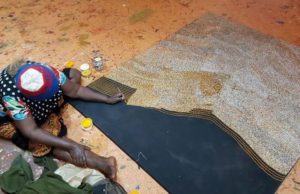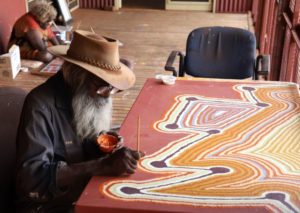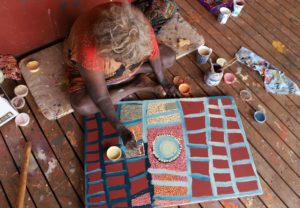The Working Life of a Studio Manager at Warlayirti Artists

Poppy Lever
Poppy Lever is Studio Coordinator for Warlayirti Artists. In this interview Poppy talks about her role and her hopes for the art centre going into the future.
Coming To Balgo
I had spent a couple of months in Alice Springs a few years ago, I just absolutely fell in love with the desert and the landscape and the whole place. I just felt an affinity with the place. Once I left, I just couldn't stop thinking about it. I had a few friends who were working in art centres and I've got an arts background, so I decided I wanted to give it a try.
I just applied for lots and lots of jobs. Balgo was the one that stuck and yeah, my parents had lived in Halls Creek and worked there. They told me a few things about Balgo. Little did I know that Balgo actually has one of the most incredible art histories of any place in Australia. I went into this place not even realising what I was going in for. I'm very glad I did it because it's pretty special.
All About This Job
Every day is completely different, and it all depends on what's happening in the community. My role is to facilitate the arts. I do a lot of paint mixing and guiding artists in form, organising exhibitions, sending works off to galleries and doing sales. In order to facilitate art, you have to make sure artists are happy and comfortable. We've got a lot of elderly artists, so there's a lot of aged care involved in my work.

Imelda Yukenbarri Gugaman
I had a vague understanding of what would be involved with the job through friends in similar roles. I didn't really understand how full-on the social services side of the work can get. You help out with banking, travel arrangements, medical things, administration things. There is a lot involved in aged care. You can also find yourself looking after kids who are running around the place. Most of all you are a sounding board when people need one. It is about making sure that people are okay.
It's a small community, so when things happen people come to the arts centre to grieve or to meditate and to go through that. You're very much a part of everything that's happening in the community.
You don't know which hat you're going to be putting on for any given day. Each day feels like a lifetime with everything that can possibly happen, while at the same time a week in an art centre goes by like the blink of an eye. All of a sudden a week's gone. You're like, how did that even happen? The first hour of the day can be really quiet and you're thinking, "Ah, it's gonna be a really calm day," and then boom, everything changes. You always have to be aware that anything and everything can happen.
Background In The Arts
I don't think you necessarily have to have an arts background to be the art centre manager. You can focus on the finance, administration side of it and share the studio side with someone with an arts background.
Having some kind of aesthetic training and the ability to be able to recognise good art, to be able to mix colours, is really essential to a well-functioning art centre. That's why a two-person team can work really well. If you have no-one able to guide the studio process then that can harm an art centre because there's no one to recognise good art and what type of conditions are needed to create good art.
Art Centre Capacity

Balgo Helicopter Tjungurrayi
We've been through an up and down period and we're currently in this rebuilding phase. We're certainly not at capacity. You have to go slowly, slowly and just let people know that we're back in action. We're back painting really strong.
Getting to a really strong field exhibition is helpful. Desert Mob is really strong. Getting those things that everyone's involved in and really standing out, and that's when people like galleries start, "Oh, you're doing interesting stuff." They might get in contact a little bit later, or you have to just go out and campaign. You might have to start speaking with galleries and really show them some strong stuff and that builds the market for your work.
Signs That An Art Centre is Doing Well
The art centre has to be a good place and people have to be really happy about being there. I think in the past 12 months, Nick and I have really felt that difference and felt that change grow. We're so much busier than we were this time last year. People really want to be there. People are laughing and there's a lot of joy. When there are more people there, there's more productivity. There's a lot more artwork happening. If people are practising more and more, their art is going to get better.
Through that productivity, that's where you get some really strong works happening. That's when it's going well and then that's when the outside market can grow well as well. You can't develop that strong artwork without having a place for people to be.
Ten Years From Now

Lucy Loomoo
It is possible that in ten years time the last of the really senior artists will not be around. They were the ones that were really strong back in the 1990s and early 2000s. So hopefully the emerging senior artists will continue to grow their art. Young people have started feeling like the art centre is a good place for them, sometimes they can feel it is just a place for old people. But it's more than that, it's really a strong cultural and an economic hub.
Hopefully, in ten years the art centre will have stuck to its core focus, which is painting and culture and not being distracted by other things, which can lead down different paths. The core of painting is still really strong and the core of culture is still really strong.
One Big Wish
I think one of the big strengths I'd like to see develop is a financial understanding. I think it's really important to build financial knowledge. That's something that I don't think a lot of people in the community have been exposed to or been given too much guidance with how to their manage money. I think one of the biggest challenges is that saving is difficult when big families rely on a few for income. This can lead to a kind of boom and bust cycle. Developing a stronger understanding of how to manage money will create a greater sense of security for the artists so they can feel strong and hopefully lead to self-managed Art Centres.
